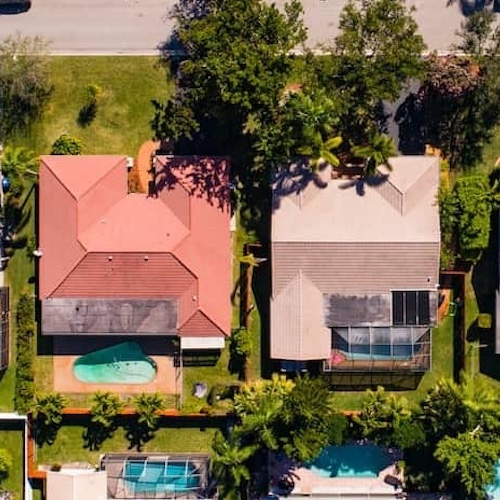What is a wholesale real estate contract?
Contributed by Tom McLean
Jul 31, 2025
•7-minute read

Eager to invest in real estate but short on cash? Real estate wholesaling allows you to buy and sell contracts without a large up-front investment. This path requires a careful understanding of what's involved, including how a wholesale real estate contract works, what’s included in a wholesale real estate assignment, and how do you write a wholesale real estate contract.
How does a wholesale real estate contract work?
Real estate wholesaling involves buying a contract to purchase a property for a specific price and then reselling that right to another buyer for a higher price, without actually purchasing the property.
Here’s how it works: First, the wholesale buyer signs a contract with the seller, granting them the exclusive right to purchase the property for a specific price. Then, they attempt to reassign the contract to another buyer for a higher price. The difference between the two prices is the wholesaler’s profit.
At the time of the contract, the wholesaler and seller enter what’s called the “doctrine of equitable conversion.” This means the wholesaler has the legal right to transfer the contract, while the seller retains the title to the home. Once the wholesaler reassigns the contract, the end buyer completes the sale directly with the seller.
Understanding the parts of a wholesale real estate contract
Real estate wholesaling contracts consist of two main components: the wholesale real estate assignment contract and the wholesale real estate purchase agreement.
What is a wholesale real estate assignment contract?
A wholesale real estate assignment contract is a legal document that transfers the right to purchase a property from the wholesaler to an end buyer. Once the seller and wholesaler have entered into an equitable conversion, an assignment of the real estate purchase and sale agreement is drafted.
The agreement stipulates that the new buyer will assume ownership of the property. This includes purchasing the home from the seller. The wholesaler is then clear of all responsibility.
The assignment also includes the wholesaler’s payment terms. When the assignment is signed, the wholesaler typically receives a portion of their profit as a deposit. After closing, they’ll be paid the remaining balance.
This contract is essentially a short-term investment strategy in which the wholesaler aims to make their money quickly, ideally within 30 days. Although wholesale real estate laws vary by state, the process typically involves the wholesaler acting as an intermediary between a home seller and an end buyer.
What’s included in a wholesale real estate purchase agreement?
A wholesale real estate purchase agreement is a standard contract between the property owner and the wholesaler. It specifies details like the purchase price, terms, contingencies, and closing date. This agreement provides the wholesaler with the contractual right to purchase the property, but it only involves the seller and the wholesaler and doesn’t transfer ownership.
The assignment contract contains a copy of the original purchase and sale agreement between the seller and wholesaler.
The basics
The wholesale real estate purchase agreement has a lot of moving parts. Common components include:
- Naming the parties involved. This identifies the seller, the wholesaler, and the end buyer.
- A description of the property. This includes the property's address and legal description.
- Deed type. This specifies which type of deed comes with the sale. A warranty deed guarantees a clear title, while a quitclaim deed transfers the property without guarantees.
- Condition of premises. This section outlines the property's condition, including any necessary repairs. Most wholesale properties are sold as is.
- Purchase price and financing. The agreement will include the sale price, the terms of financing, and the location of deposits. Financing is typically provided in the form of cash or hard money to facilitate a quick closing.
- Closing date. This is the date by which the transaction is scheduled to be completed. Closing on a house includes transferring the deed, prorating property taxes, disbursing funds, and paying the assignment fee. A title company or attorney usually handles the escrow and paperwork involved.
Contingencies, clauses, and more
The contract may include additional clauses, such as contingencies.
- Financing contingency. Allows the buyer to back out of the transaction if they’re unable to get financing. This won’t be an issue if you have a cash buyer.
- Inspection contingency. An inspection contingency allows the buyer to back out of the wholesale contract if they’re dissatisfied with the results of a home inspection.
- Marketable title option. If the buyer can’t obtain title insurance, the deal can be called off.
- Buyer and seller default clauses. These define the penalties or consequences if either party defaults on the sales contract, which can trigger, for example, the forfeiting of a deposit or legal action.
- Risk of loss and damage clause. This clause protects the buyer in the event of property damage that occurs while the property is under contract.
- Adjustments clause. This covers prorated expenses such as property taxes, rent, utilities, and other charges based on the closing date. This can vary depending on the state where the transaction occurs.
- Statement regarding lead-based paint. This disclosure notes whether the property has lead-based paint. This is required by federal law for residential properties built before 1978.
- Addenda. The document includes standard legal language at the end of the contract as well as any additions made after the initial signing.
How to write a wholesale real estate contract
Writing a wholesale real estate contract involves more than just filling in some blanks. Typically, five steps are involved in writing a wholesale real estate contract.
1. Find and verify a contract template
You can choose a standard purchase and sale agreement provided by your state’s real estate commission, if available. Your real estate agent also may be able to provide a contract
However, standardized forms often fail to provide the flexibility that wholesalers and investors need. A real estate attorney can draft a contract specific to your needs.
2. Build a list of buyers and find properties
Develop a roster of cash buyers and identify motivated sellers through marketing or direct outreach. You can build this list by networking and gaining a deeper understanding of cash buyer preferences. You can then use that information to find properties to put under contract.
3. Complete the contracts and open escrow
Complete and sign the assignment agreement and the purchase and sale agreement with the seller. Then, take the signed purchase and sale agreement to your title company or attorney and deposit the earnest money to start the escrow process. Escrow is a financial arrangement in which a neutral third party holds assets or funds on behalf of the parties involved in a real estate transaction until specific conditions are met.
4. Send the assignment agreement to the buyer
Once the buyer is ready, send the signed assignment agreement to the buyer for approval, disclose your assignment fee, and complete the assignment by signing it yourself once they have returned the signed agreement. Make the assignment agreement crystal clear and specify the fees up front.
5. Close the deal
At closing, all parties will sign the documents, the funds will be disbursed, and the wholesaler will collect the assignment fee. The title company will coordinate fund transfers, deed recording, and payments. Make sure the buyer submits their nonrefundable earnest money to the title company.
FAQ
Here are answers to common questions about wholesale contracts.
Can a seller back out of a contract?
Yes, a seller can back out of a contract if specific clauses allow it or they have a valid legal reason. In most cases, sellers can find legal justification to back out of a deal if they have included clauses in their contract and are motivated to void the agreement. This can happen for many reasons, such as:
- The owner got a higher offer from another buyer outside of the wholesale contract.
- The seller was unable to find a suitable replacement home to move into.
- They have seller's remorse and no longer want to sell their property.
However, if a valid contract is in place, the contingencies are satisfied, and the wholesaler performs according to the contract, the buyer can face legal consequences for breach of contract.
Where do I get real estate wholesale contracts?
If you are interested in creating a wholesale contract, you must first find a motivated homeowner who wants to sell their property. Then you can create a wholesale contract for the seller to sign. The experts recommend using a reputable real estate legal site, networking with other wholesalers, or consulting with a real estate attorney to access an existing contract template or create a contract from scratch.
Can I wholesale commercial real estate?
Yes, you can wholesale commercial properties. However, these transactions are often more complex and riskier, requiring more due diligence, longer timelines, and different buyer expectations than wholesale residential deals. Wholesaling as an investment strategy is less common in the commercial real estate world, so your competition will be low. However, these properties are larger and more expensive than residential homes, making this practice slightly riskier. There are also more laws and regulations to follow when drafting purchase contracts for commercial buildings.
What is the cost of a wholesale contract?
There is no fixed cost for a wholesale contract. But paying for a customized contract or legal review to protect yourself is a good idea. Legal fees for drafting or reviewing contracts can range from $100 to more than $1,000.
The bottom line: Wholesaling may be a wise investment strategy
Wholesalers can make money from real estate deals without actually buying anything. They simply flip the contract and make a profit from the service provided. Everyone stands to win, as both the buyer and seller can benefit from a quick transaction. But wholesale real estate contracts can be complicated, especially if you’re new to them. That’s why it’s crucial to consult an attorney, a licensed real estate professional, or both before signing on the dotted line.
Dreaming about investing in real estate or buying a home? Do it with confidence that comes from a sense of preparedness. Learn more about homebuying and the mortgage process, and initiate the mortgage approval process online today to get started.

Christian Byers
Christian Byers is a freelance writer and editor with experience covering diverse topics. He has a B.S. in Journalism and a B.A. in Communications from Eastern Michigan University. His experience as a writer and editor includes publications such as The Eastern Echo, Rocket Central, and Woodward Sports Network.
Related resources

11-minute read
Land contracts: What they are and how they work
Land contracts are a form of seller financing where the seller holds the title while the buyer makes payments. Learn how they work and whether they're right for...
Read more

6-minute read
Investing 101: How to buy multifamily property
Are you interested in multifamily investing? Learn about investing in multifamily real estate, loan options, and how to buy a multifamily property.
Read more

5-minute read
What is a multifamily home and is it right for you?
A multifamily home is a residential property with more than one housing unit. Learn about the types of multifamily homes, their pros and cons, and financing ...
Read more